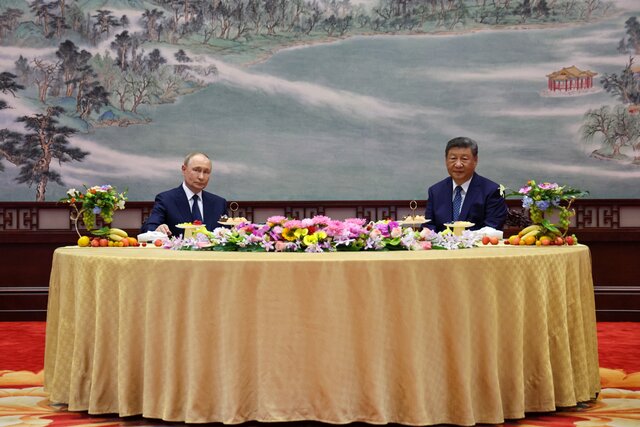A gas breakthrough, if it’s not all hot air. Russian authorities announce memorandum on Power of Siberia-2 gas pipeline that could reshape Chinese and global markets
Manage episode 504051230 series 3381925

During Vladimir Putin’s visit to China, Russia’s delegation reportedly signed 22 documents — a whirlwind of memoranda, protocols, contracts, and agreements that include a potentially “breakthrough” deal on the supply of natural gas. President Putin arrived on August 31 for a four-day official visit, joining a Shanghai Cooperation Organization summit and holding talks with Chinese leader Xi Jinping, Turkish President Recep Erdogan, Slovak Prime Minister Robert Fico, and Serbian President Aleksandar Vucic, among others. Putin is also slated to attend the September 3 celebrations in Beijing marking the 80th anniversary of the end of World War II.
The Russian news agency Interfax notes that “the documents cover areas of cooperation such as space, nuclear energy, agriculture, healthcare, education, media collaboration, innovation, and veterinary-sanitary control.” Interfax identified a “key” document among them: an agreement on strategic cooperation between Gazprom and the China National Petroleum Corporation (CNPC). However, the Kremlin did not disclose the substance of the signed agreements.
Following delegation talks among Russia, China, and Mongolia in Beijing on September 2, Gazprom’s head, Alexey Miller, announced that Russia and China had signed a legally binding “memorandum of construction” for the Power of Siberia–2 gas pipeline. He also stated that Gazprom and CNPC had signed “commercial arrangements” to expand gas deliveries via existing routes.
Plans to launch the pipeline, which could make Russia the largest gas supplier to China, have been under discussion for several years. The Power of Siberia–2 would run from Gazprom’s fields in Yamal, through Western Siberia and Mongolia, to northeastern China. The pipeline is expected to be completed in the 2030s.
Bloomberg described the gas pipeline deal as a “diplomatic win” for Putin. However, the agency noted, China has not commented on reports about the “memorandum.” In its reporting on the meeting between Putin and Xi, the Chinese state news agency Xinhua did not mention the pipeline, noting only some 20 cooperation agreements. According to The Financial Times, the document on pipeline construction signed by the parties contains only general provisions and omits details regarding pricing, which has been the main point of contention.
Miller told the press that issues related to financing the construction of Power of Siberia–2, as well as the commercial supply terms, remain to be discussed. According to the Gazprom chief, the gas price for China will be lower than for E.U. countries due to reduced transportation costs.
The deal between Russia and China, even without specific terms on price, “signalled a significant shift in the global gas market,” observed the Financial Times. For China, it offers an alternative to importing liquefied natural gas (LNG) from the United States, Qatar, and Australia. Meanwhile, for Russia, the agreement could help support its economy amid Western sanctions and shrinking energy revenues from Europe. From this perspective, the commercial terms for Power of Siberia–2 will be crucial for Moscow, the paper writes. At present, Russia is already China’s largest supplier of pipeline gas and the third-largest supplier of LNG, after Australia and Qatar, according to the Financial Times.
Victor Gao, chair of the China Energy Security Institute, believes Russia’s announcement of the gas deal was “a bit premature.” “This may be more [a signal] of their intent rather than an agreement already reached,” he told the Financial Times.
Alexander Gabuev, director of the Carnegie Russia Eurasia Center in Berlin, told the paper that expanding supplies via existing routes appears to be “a real deal.” As for Power of Siberia–2, the expert said, China is merely signaling “yes, we’re interested, we accept the route through Mongolia, but let’s talk about price and terms.” “A legally binding memorandum without a price or timeline is not a final agreement,” Gabuev noted.
The Moscow Times also pointed out that Russia, during Putin’s visit, failed to secure expanded banking cooperation with China. Specifically, the parties apparently failed to reach an agreement on resuming full operations of China’s UnionPay payment system in Russia and on accepting Russian Mir bank cards in China. Discussions on these issues had previously been announced by VTB Bank head Andrey Kostin.
Still, Russia did reach certain agreements in China. On September 2, the Chinese Foreign Ministry announced that, for one year, it would introduce a trial visa-free regime for Russians. Starting September 15, Russian citizens will be able to remain in China without a visa for up to 30 days. Since July 2025, similar entry rules have been in place for citizens of more than 70 countries.
67 episodes



